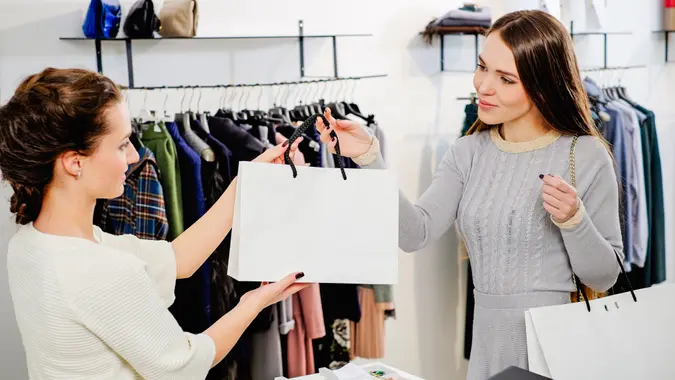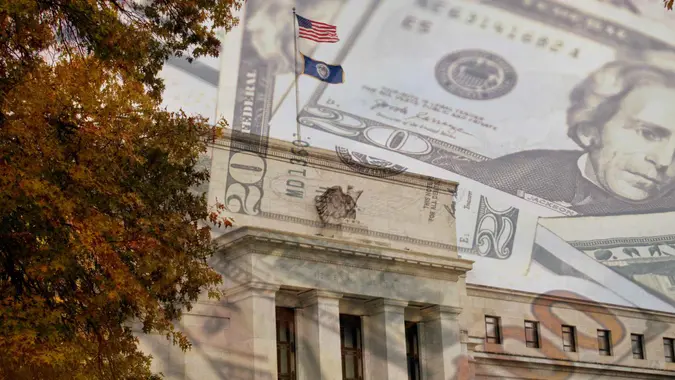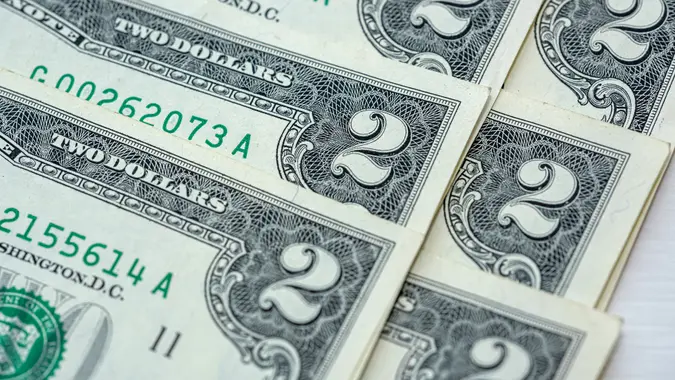The Risks That Come With Public Venmo Transactions, Emojis and More
Commitment to Our Readers
GOBankingRates' editorial team is committed to bringing you unbiased reviews and information. We use data-driven methodologies to evaluate financial products and services - our reviews and ratings are not influenced by advertisers. You can read more about our editorial guidelines and our products and services review methodology.

20 Years
Helping You Live Richer

Reviewed
by Experts

Trusted by
Millions of Readers
There’s no doubt about it — having a Venmo account makes life easier. From splitting restaurant checks with friends to making contactless payments at businesses, the ability to send and receive money from your phone is a real game-changer.
Read: 9 Bills You Should Never Put on Autopay
However, it’s important to be aware of the privacy risks associated with the app if you don’t have the correct settings in place. The app offers three privacy settings — public, friends and private, each denoting the audience privy to your transaction history.
In an interview with CNET, the company revealed privacy settings are public by default. Therefore, if you don’t want the entire world to have access to your spending habits, you need to go into your account and change that.
“Unfortunately, most people are unaware of the risks posed to their safety and security with the Venmo app,” said Wayne Brown, senior partner at Dugan Brown, Federal Retirement Experts, based in Dublin, Ohio. “To start, there is no way to make your profile undiscoverable or prevent random requests from strangers.”
For example, he noted that when the public found out former White House press secretary Sean Spicer had a Venmo account, he was inundated with requests for money that he had no way of stopping from rolling in.
“And this only begins to scrape the surface of what’s possible,” Brown said.
He also referenced a 2018 study conducted by Hang Do Thi Duc, a Berlin-based coder and privacy researcher, who was able to access public Venmo data to find information on the spending habits and personal lives of various users.
For example, she discovered a man in Santa Barbara, California was making a living selling marijuana edibles, with product names like “Gorilla cookies.” She also watched love bloom between two Texans who left each other flirty comments on a payment.
Since Do Thi Duc was able to determine users’ weekly habits — i.e., trips to the grocery store — along with personal details — i.e., marital status, whether they had pets and who pays for utilities — Brown said this is a serious security threat.
“With all of this information, it would be possible to figure out where someone lives, in conjunction with determining when they’re out of town, putting the user at significant risk,” he said. “Using emojis, believe it or not, can compound these issues by making it even easier for attackers to track your habits and predict future behavior.”
As to what other details scammers can pilfer from Venmo, Brown said the list goes on.
“Additional information can also be obtained from looking at Venmo transactions, such as whether the user has an iPhone or an Android,” he said. “Once this information is obtained, they can then begin trying to snag other extremely personal and private information, such as Apple ID credentials.”
Consequently, Brown believes it’s not safe to make this type of data publicly available.
“Really, from the perspective of safety and security, the message is clear — if someone must use Venmo, they should make sure their settings are private, so that no transactions can be shared or viewed by anyone other than the user themselves,” he said.
If you forget to change your settings or otherwise find yourself in a situation where you’ve been a victim of fraud, Brown said you may still be able to get your money back.
“Although Venmo states that it is not possible to cancel a payment to an existing Venmo account on their website, that doesn’t prevent users from disputing a transaction and getting the payment reversed,” he said.
While actions like leaving your Venmo sharing open to the public and using emojis can cause you to become victim of fraud, Brown said that isn’t the only concern.
“It’s important to realize how sharing your information in the background can cause serious stress within social circles,” he said. “Any time you use Venmo to pay for something, you create a situation where people can see your activity.”
For example, he said if you go out to eat with a group of friends and don’t invite someone, the person can potentially see they were excluded from the outing. Additionally, he said actions like dating someone you don’t want your friends to know about or buying a gift for a significant other can be tricky if your transaction history is shared with others.
Your personal spending habits are no one else’s business. Opening your Venmo transaction history up to the public — or even to your friends — can create massive problems that can easily be prevented, so do yourself a favor and keep it on lockdown.
More From GOBankingRates
 Written by
Written by 

























